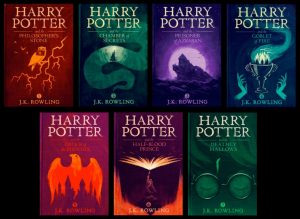By Colorado Review Editorial Assistant Lindsey Bush
If you’re anything like me, the news that spread across social media last week was a moment of pure joy. A friend texted me, “All the Harry Potter movies are coming to Netflix,” accompanied by an entire line of text consisting of exclamation points. I was delighted. Sadly, this turned out to be a rumor in the U.S. A few countries in Europe will have the pleasure of viewing all eight of these films on the streaming website, but due to viewing rights and logistics far beyond my comprehension, the U.S. will not have that same opportunity.
 Nevertheless, this aborted joy got me thinking about movies—specifically about books that are made into movies. Full confession: I am a book nerd. I read everything and anything, wherever and whenever possible. Really what I like are stories; every person has a story and I like hearing them. But I also like escaping into them. I like to observe other people’s viewpoints and experience things that have never happened to me. And the easiest (and least fraught) way to do so is through books.
Nevertheless, this aborted joy got me thinking about movies—specifically about books that are made into movies. Full confession: I am a book nerd. I read everything and anything, wherever and whenever possible. Really what I like are stories; every person has a story and I like hearing them. But I also like escaping into them. I like to observe other people’s viewpoints and experience things that have never happened to me. And the easiest (and least fraught) way to do so is through books.
However, I also love movies for this same reason. They’re another way of telling stories, of bringing characters to life, of showing experiences that I am alternately grateful and sad not to experience. But what happens when a beloved book becomes a movie? Honestly, my first thought is “oh no.” Why? Because so often the movie lets me down, ruins my imagined world, and refuses to bring to life the best parts of the book.
Take, for example, Harry Potter. The books are tremendous, and I highly recommend them to anyone, anywhere. I’ve read all of them multiple times and will probably return to them many more times throughout my life. The books were a phenomenon, so I was pretty excited when the movies started to be produced. However, as the movies progressed through the series, in my humble opinion, they got worse. They veered away from the carefully crafted story, where bits from each of the previous books were woven together for us to fully understand by the end of the seventh book. They skipped over large and important parts of the story (I won’t offer any examples here in fear of spoiling someone’s discovery, but if you’ve read the books and watched the movies, you can probably come up with a list).
On the other hand, I also understand that movies offer us a way to view our favorite books. They give us beloved performances (who can resist Dame Maggie Smith as Professor McGonagall?) and visual images for things our imaginations failed at conjuring. They’re another way to immerse ourselves in the world behind the words on the page.
Really my discussion here is an irrelevant one. Some people prefer books. Others prefer movies. Some people change their minds based on the day, time, book, or movie in question. Sometimes I want to read the book, and sometimes I want to watch the movie. What is important is that books and movies offer us stories to escape into; they explore new worlds, journeys, and ideas. And that’s the most magical thing of all.